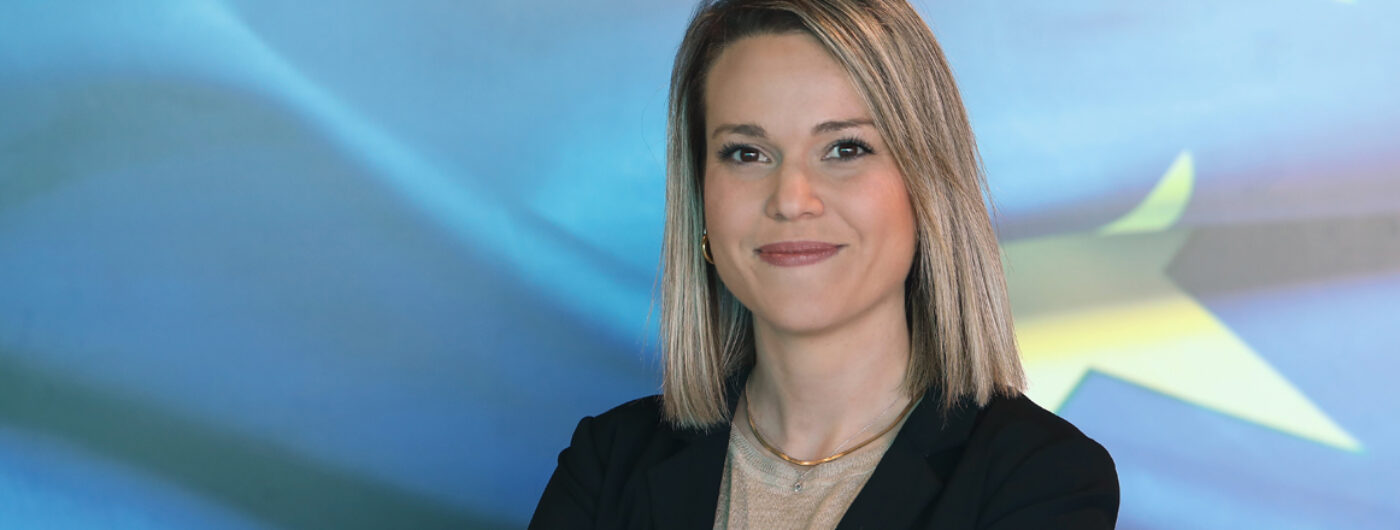
TransLogMed: Navigating new horizons and connecting continents
Marta Miquel is the Chief Business Officer at the Barcelona-based Escola Europea for Intermodal Transport, promoters of the UfM-labelled project TransLogMed. Evolving within one of the least integrated regions of the world, the TransLogMed project works as a bridge between continents towards achieving more efficient and environmentally-friendly transport solutions.
The Euro-Mediterranean region boasts an extensive network of ports, including key hubs like Barcelona, Genoa, Rades La Goulette, and many others, while it handles a substantial volume of trade, with approximately 30% of the world’s maritime trade passing through the Suez Canal, connecting the Mediterranean to the Red Sea.
Surprising as it may seem, this region is nonetheless one of the least integrated in the world, while inefficient transport modalities between countries incur undesirable greenhouse gas emissions in the context of growing environmental concerns. An answer to these concerns lies within intermodal transport solutions, which use different types of transportation (including maritime transport, road, rail, and inland navigation) in a coordinated way to move goods efficiently from one place to another, especially when those goods need to travel over long distances. And the TransLogMed project aims to do just that.
In the framework of this project, Marta played a pivotal role, overseeing its operational execution. Her responsibilities spanned programme development, activity preparation, and coordination of conferences, training initiatives, and communications designed to enhance the project’s visibility. Marta’s academic foundation firmly rests on communication, languages, and international business. But her career trajectory took an unexpected turn when she delved into the intricate world of Port-Logistics. She honed her expertise through a Master’s programme in Shipping Business and Port Management, after her path led her to the Escola Europea and the Port Community of Barcelona, where she embarked on a journey of holistic learning, with a keen focus on human capital development.
Marta’s day-to-day life within this project was nothing short of dynamic. She efficiently managed faculty and teaching staff, meticulously reviewed training materials, and organized technical visits to companies and port facilities. Additionally, she was responsible for booking essential services like shipping lines, ensuring the seamless execution of project activities.
Working with different Mediterranean countries for the first time was not without its challenges. The cultural differences between the northern and southern Mediterranean regions added complexity to the project, starting with the language barrier. Moreover, organizing initiatives in countries she had never visited presented logistical hurdles. However, in Marta’s own words, this situation ended up being personally rewarding as “there is a lesson to be found in every challenge. It was interesting to see how one solution would work for a country but not for another, due to each country’s unique environment.” This experience helped her and her colleagues to think outside the box to find innovative solutions to new challenges they hadn’t experienced before.
In the backdrop of the COVID-19 pandemic, which disrupted global supply chains, intermodal transport in the Mediterranean played a critical role in constructing resilient transport chains. It offered the flexibility to adapt to changing cargo volumes and minimized human contact during cargo transfers, addressing health and safety concerns. Moreover, intermodal transport made a substantial contribution to reducing greenhouse gas emissions, thereby enhancing the efficiency and sustainability of transportation networks.
Over the course of five years, TransLogMed had two primary objectives: first, to enhance the knowledge of professionals in the sector, with a special emphasis on training women in southern Mediterranean countries, and second, to promote the efficiency and sustainability of intermodal transport in the Mediterranean. The trainings were hands-on, often taking place on ships traveling between North and South Mediterranean destinations. This unique approach allowed participants to gain a deep understanding of logistics operations, enabling them to identify bottlenecks and propose innovative solutions, significantly contributing to enhancing professional performance in the transport and logistics sectors across the region.
The issue of gender equality and inclusion was of paramount importance to the project. All training courses ensured a minimum of 50% participation by women, actively promoting their involvement in the transport and logistics sector. While historically male-dominated, the industry’s embrace of digitalization and new technologies has paved the way for greater female participation. Marta herself admits that executive positions in this sector are still heavily directed by males, and being a young woman as she is sometimes proved difficult, mostly at first.
“However, as the years have gone by and as we have been working in more countries, I have realized that there have been more and more girls as interlocutors. There may have been mostly men when I started, but with time you could notice that, in the end, who are in the day to day and who end up doing many of the things are now women. And I am very happy about that.”
Looking forward, Marta envisions a significant impact on the maritime transport and ports industry. The focus has shifted from concrete infrastructure to human capital and the development of essential skills. Collaborations forged during the project are expected to continue, with more projects powered by public and private investment on the horizon.
Marta Miquel’s journey stands as a testament to the power of education, collaboration, and dedicated efforts. Her role in the TransLogMed project, alongside her passionate team, has not only improved the professional performance in the transport and logistics sectors but has also paved the way for a more inclusive and sustainable future in the Mediterranean region.
More on the UfM actions on sustainable transport and urban development
- Learn more about the TransLogMed project
- What are the UfM actions on sustainable transport and urban development? Check it out here.
- Consult the UfM Regional Transport Action Plan for the Mediterranean Region.

